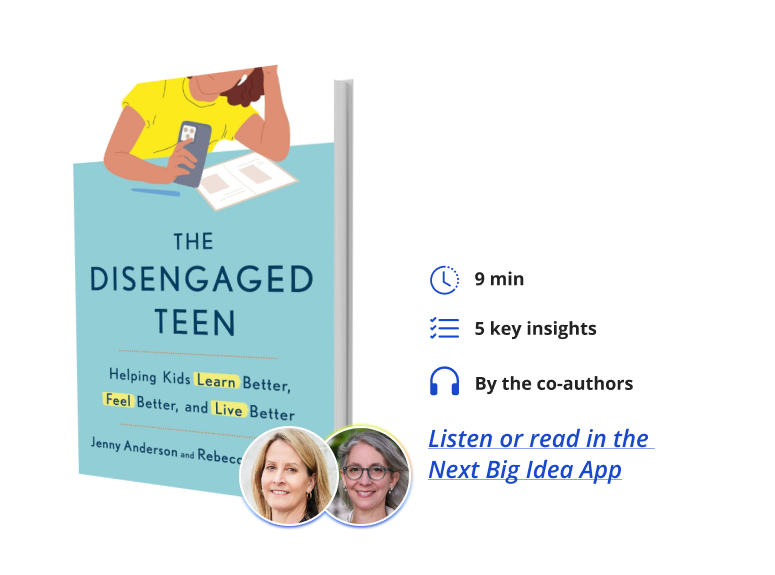Jenny Anderson is an award-winning journalist who spent over a decade at the New York Times before pioneering coverage on science and learning at Quartz. She now writes an education column for Time. Rebecca Winthrop is the director of the Center for Universal Education at Brookings. She is also an adjunct professor at Georgetown University.
What’s the big idea?
Academia is shifting from an Age of Achievement to an Age of Agency. A student’s success will no longer be judged primarily based on their grades, but rather on their ability to set goals and develop winning strategies. Parents can help their children thrive in this new context by nurturing a state of exploration at home and in their studies.
Below, co-authors Jenny Anderson and Rebecca Winthrop share five key insights from their new book, The Disengaged Teen: Helping Kids Learn Better, Feel Better and Live Better. Listen to the audio version—read by Rebecca—in the Next Big Idea App.

1. Engagement—not grades—predicts happiness and achievement.
To learn well, kids need to be engaged. Unfortunately, a shocking number of them are not. In third grade, 75 percent of kids are engaged in learning. By 10th grade, only 25 percent say they love school. How kids feel about learning is a big part of what makes them successful at it.
Engagement, or learning well, is not about being able to grind through, check the boxes, or be smart enough to “just get it.” It’s the thoughts, feelings, and actions that combine to give kids the drive to dig into what they care about and stick with it. When kids lack this motivation and skill, they check out.
Surprisingly, plenty of kids who check out bring home good grades. That’s often because school is too easy, and they can skate by. But they are not developing the essential learning skills they will need to thrive and are often unhappy and bored in school.
2. Parents need to help their kids better understand themselves as learners.
It’s hard to know what’s happening under the hood of learning because a lot of motivation and engagement in school is invisible. We created the four modes of engagement to help parents, teachers, and kids themselves understand how to be more involved, persistent, and self-aware—in other words, more engaged. The four modes are:
- Passenger. Fifty percent of kids are coasting along, doing the bare minimum, and complaining about the pointlessness of their classes. They need help connecting school to their interests, skills, and learning needs.
- Resister. These are the kids often labeled “problem children,” but who are more often children with problems. They struggle with feelings of inadequacy or invisibility and frequently act out or withdraw. They are using their voice to tell us school isn’t working for them, even if it comes out inappropriately. They can quickly turn things around with support and use their energy to learn well.
- Achiever. Parents and teachers love kids in Achiever mode because they make them look good and think they are on the path to success. But many of these young people are fragile students who are risk averse and often on the edge of burnout. They need support in taking on new challenges and encouragement to value themselves beyond their achievements.
- Explorer. These learners are becoming the authors of their own lives. Driven by internal curiosity, these kids investigate questions that matter to them and persist in achieving their goals. They develop resilience and skills that help them thrive. This is the holy grail where kids achieve better, are happier, kinder, and more self-directed. Less than 10 percent of kids get to be in Explorer mode at school.
3. Parents need to create as much time for their kids in Explorer mode as possible.
Notice your child’s interests and lean into them. This can feel counterintuitive, especially with kids in Passenger mode. But many kids in Passenger and Resister modes are out of gas and need something to fuel them. Interests are the canvas on which skills are built, skills of learning, but also doing. Interests can spill over to academics over time.
Don’t take away an interest from a kid who is not “performing” or write off an interest because it is not “college-worthy.” Kids need to know who they are and what they care about, and interests are ground zero for this.
“Interests are the canvas on which skills are built.”
When children have an interest, they find ways to pursue it. This builds agency—the skills and will to set meaningful goals and marshal resources to meet them. In an era that requires navigating massive technological and social changes, agency—not just achievement—will be paramount.
4. Help kids when they get stuck in a mode.
The modes are temporary states that kids slip into and out of. They are not identities. But sometimes, kids get stuck, and we have to help them get unstuck.
When a child is in Resister mode, withdrawing or acting out, find out why. Don’t assume you have a bad kid—assume you have a child with problems. Get in the trenches with them. More often, they need someone by their side who is willing to see how scary it is to take a step forward. Kids in Resister mode can catapult to Explorer mode with help because they have agency.
For kids in Passenger mode, stop nagging. Nagging diminishes autonomy, and kids in Passenger mode need more autonomy. Let them pursue their own interests instead of directing them toward yours (or your college-worthy ones). As long as they are not hurting themselves or others, interests boost kids’ motivation. Kids need a spark, a reason to care. Without it, they will stay neutral.
When you see your child in overdrive, in Achiever mode, help them take small risks in their learning. Don’t take the class with the easy A. Let them take the class they are curious about. Achiever-mode kids are often fragile learners and want to play it safe.
“Don’t assume you have a bad kid—assume you have a child with problems.”
Kids occupy three mental states when learning: relatively comfortable, relatively uncomfortable, and panicked. Panic requires us to check in and help them with what they need. But too many parents step in at “relatively uncomfortable,” which is unproductive. Struggle is where we learn. Help them take small risks now so that they can take bigger ones later.
5. Learning requires courage.
Teens need our support to learn bravery. Think of the courage it requires to ask a question. To admit you don’t understand something. To ask for help. To say in front of your peers that you are confused. We want to raise brave learners—kids with Explorer muscles, not compliant ones. This is not just because Explorer mode makes them happier, though it does. It’s because the tectonic plates underpinning education are moving, and kids with agency will be winners in the new system.
The architecture of schooling is shifting. It is transitioning from an Age of Achievement, where success is measured by academic ability alone, to an Age of Agency, where success will also depend on students setting some of their own learning goals and developing strategies to reach them. The testing giants that administer everything from the SAT to the AP exams are beginning to shift how they assess students’ skills. In AP seminars, kids can pick a topic they care about and explore it. The age of testing one skill at one moment in one room will soon be over, and in its place, kids will need to know how to think for themselves and make decisions.
Spending time in Explorer mode will help them do that. This means giving them the space to have some say over how they spend their time, especially outside of school, and some say in how they study. This is one of the best things parents can do to help prepare their children to thrive.
To listen to the audio version read by co-author Rebecca Winthrop, download the Next Big Idea App today:































